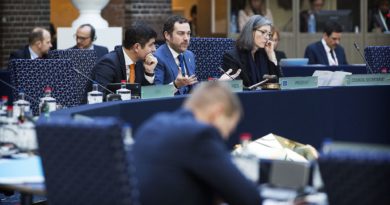Are people taking centre stage in the EU debate?
The future of more than 4 million EU citizens took centre stage in the Brexit discussions this week. Michael Tomlinson, a Conservative Member of the British Parliament and Leaver, wrote to the President of the European Council asking to protect the rights of EU nationals living in Britain (some 3 million) and British residents in other EU countries (about 1.2 million).
Signed by other 80 right-wing parliamentarians, the letter called on Donald Tusk to include the topic in the agenda of the European Council meeting of December and strike a deal before Brexit talks formally start. This would seem in line with what EU rights campaigners have been asking.
But the letter criticised specifically Michel Barnier, chief Brexit negotiator at the European Commission, an institution that has been regularly attacked by Brexit proponents. Barnier was accused of preventing “negotiations on this issue between the democratically-elected governments of EU member states making it harder to achieve what is in everyone’s interest.”
It took few hours for Brussels to reply.
My reply to the UK MPs on the status of EU citizens in the UK and UK citizens living and working in Europe: https://t.co/NR0KC80j3k pic.twitter.com/lBRQfv7rr5
— Donald Tusk (@eucopresident) November 29, 2016
“Your concern for the status of EU citizens in the UK and UK citizens living and working in Europe bodes well for the future negotiations, especially since we have assumed that one of the main reasons for the vote for Brexit was the rejection of the free movement of people and all the rights it entails,” replied Tusk.
On the criticisms to Barnier, he added: “It is a very interesting argument, the only problem being that it has nothing to do with reality. Would you not agree that the only source of anxiety and uncertainty is rather the decision on Brexit? And that the only way to dispel the fears and doubts of all the citizens concerned is the quickest possible start of the negotiations based on Art. 50 of the Treaty?”
He then reassured that “ for as long as the UK remains a member of the EU, the Treaties guarantee the rights of all EU citizens, including UK citizens, as regards their residence, work, social security and health.”
Tusk’s response indicates that the EU will not enter into side talks until the formal Brexit process starts. This is also the position of German Chancellor Angela Markel, who according to Politico, refused “pre-negotiations before Britain tenders its formal notice of intention to leave the Union.”
People and the political game
But what looks like political gaming has an impact on people’s lives and it creates further tensions and anxiety. “After the sense of loss post-referendum, feelings of anger and irritation at the government game are now creeping in,” says Maike Bohn, a German in Bristol and a campaigner of the3million, a group representing non-British EU citizens in the UK. “It is clear to me that the EU cannot officially start negotiating on this point. Let’s not forget that Britain started this. It is a political game and there is anger because people see a hostile rhetoric in this country, in politics and in the press, that you do not see it in other countries of the EU.”
In truth, no one ever said during the referendum campaigns that the rights of EU citizens in the UK or Brits in Europe would be put in question after Brexit. But the British government has so far refused to offer guarantees to EU nationals, claiming that unilateral action would put at risk the rights of Brits living in other EU states.
“It would be a huge burden off my chest to see tangibly written in law that the rights of EU citizens in the UK – and also British in Europe – are secured. But I worry more about what this situation means culturally. I have been in the UK for 20 years, I love the values of this country and feel they are endangered by the current wave of nationalism,” adds Bohn.
What she finds encouraging is that Brexit has also awoken a strong sense of European identity: “We are all rediscovering our European roots and the values of the European Union. There is a fervour for Europe we have never seen before. Personally, I now fully appreciate what the EU has done for me.”
Long blamed for being distant from real lives, the European Union is now facing a crucial debate and people are the centre of the attention. Perhaps not just in the way they would have wanted.
Claudia Delpero © All rights reserved.
Photo: Stockholm, Sweden, by Jürgen Howaldt via Wikimedia Commons.




